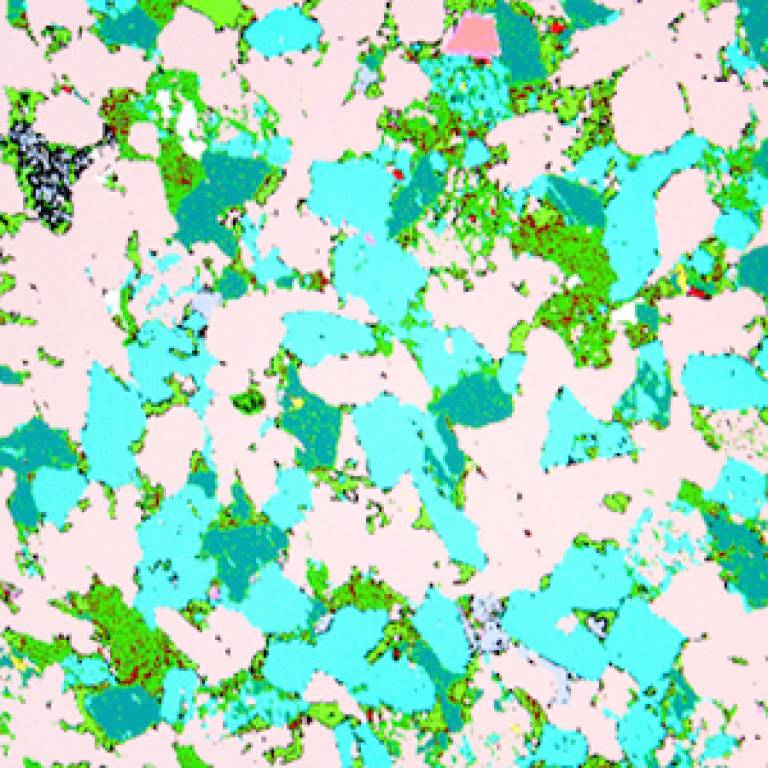UCL announces partnership to enable new insights in the study of sedimentary geology
23 February 2015
A collaboration between UCL's Department of Earth Sciences, Rocktype Limited, and FEI will potentially enable faster and more efficient processing of large data sets in the study of sedimentary geology.

Facilitated by the UCL Corporate Partnerships team, the collaboration will utilise FEI's QEMSCAN® WellSite™ analysis solution - an automated mineralogy and petrography system - at the London Geochronology Centre (LGC), which is jointly operated by UCL and Birkbeck.
The QEMSCAN WellSite technology is a high-resolution scanning electron microscope (SEM) that enables the detection, classification and quantitative analysis of mineralogy and lithology utilising energy-dispersive X-ray spectrometers. The combination of QEMSCAN with UCL's existing LA-ICP-MS (laser ablation inductively coupled plasma mass spectrometer) facilities at the Centre creates a new instrument suite capable of fingerprinting sediments with high resolution and speed. In addition, the ruggedised nature of the QEMSCAN WellSite provides a robust, field-reliable platform that Rocktype will use to rapidly analyse chemical and rock properties to calibrate well logs and more accurately predict matrix density.
With this new capability, researchers will analyse an extensive repository of samples for application in petrophysical modelling, basin modelling, reservoir quality assessment and sedimentary provenance studies.
More generally, the technology could transform the study of modern sedimentary environments and their ancient counterparts, with important applications for tectonics, geomorphology, reservoir characterisation, hydrocarbon exploration and forensic science.
Receiving the QEMSCAN instrument in his laboratory, Dr Pieter Vermeesch, Reader in Geochronology at UCL's Department of Earth Sciences, said: "London is the birthplace of geochronology, and new isotopic dating techniques continue to be developed here under the umbrella of the UCL-based London Geochronology Centre. Detrital geochronology is one of the main focal points of the Centre's research. Our collaboration with FEI and Rocktype allows us to maintain our position at the forefront of this field. We anticipate the new device to trigger a 'Big Data' revolution in sedimentary geology, with great benefits to commercial and academic users alike."
Dr Anna Clark, Director of UCL Corporate Partnerships added: "UCL has remained at the forefront of research by continually challenging and advancing state of the art technology and analysis. We are delighted to be bringing new capabilities to the university, which will help to advance knowledge and enhance funding opportunities."
Speaking about the impact the collaboration will have on the growth of his business, Dr Henrik Omma, Managing Director of Rocktype, explained: "As a scientific consultancy we strive to form strong collaborations with the most dynamic research institutions to accelerate our own R&D efforts and support fundamental research. Working with UCL and FEI we expect to set new standards for mineralogical stratigraphy and reservoir characterisation drawing on the technical and scientific expertise of the UCL team and the world-leading instrumentation made available by FEI."
Emphasising the importance of collaborating with universities, Rudy Kellner, Vice President of FEI's Industry Group stated: "Over the past decade FEI has been at the forefront of microscopy research supporting several universities around the world that are studying the fine details of reservoir rock and the impact of microporosity on fluid flow. Understanding the micro- and nano- meter scale dynamics that contribute to reservoir behaviour will be critical for improving field development plans and optimising hydrocarbon recovery. Our partnership with UCL and Rocktype is an important step in further developing use cases and technologies that will ultimately drive economic drilling, completions and recovery decisions."
A
collaboration between UCL's Department of Earth Sciences, Rocktype Limited, and
FEI will potentially enable faster and more efficient processing of large data
sets in the study of sedimentary geology.
Image
- A scan produced by the new QEMSCAN technology
 Close
Close

